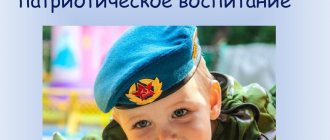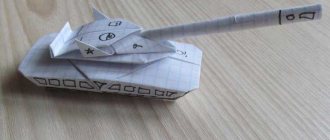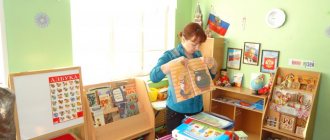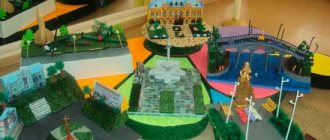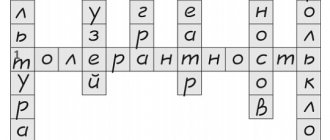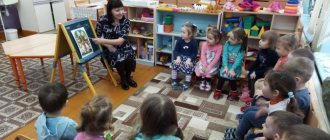“Game as a means of patriotic education of preschool children” consultation for educators
Cultivating a sense of patriotism in dramatization games on a folklore and environmental basis occurs, as it were, indirectly. It does not directly say that the Motherland needs to be loved, protected, protected.
Role -playing game
is used as one of the active forms of work on the patriotic education of children. It is often underestimated by teachers and parents. The themes of the games are monotonous, the plots are poor and formal, the roles are traditional. Games with a military-patriotic theme, reflecting the heroic deeds of our people, are becoming quite rare. Children mainly reflect the plots of foreign cartoons and films and develop aggressive plots. Here is a diagram of consistent work on patriotic education of children through role-playing games.
FAMILY KINDERGARTEN NATIVE STREET, DISTRICT HOMETOWN COUNTRY, ITS CAPITAL, SYMBOLICS
RIGHTS AND DUTIES (CONSTITUTION) .
Recently, the family has been going through hard times: in an effort to earn their daily bread, parents are paying less and less attention to their children, and the number of dysfunctional, single-parent families is growing. It is becoming increasingly difficult for a child to love his home, family, or kindergarten. Therefore, it is necessary to create conditions for the formation of an emotionally rich image of home in children. Children must learn not only to take, but also to give: to take care of loved ones from childhood, to be attentive to each other, to help in word and deed. We can implement these tasks through the role-playing game “Family”. There are several variations of this game. For example, “Family holidays”, “Family visiting grandma”, “Our friendly family”.
It is difficult for children of primary preschool age to imagine the city as a whole, which means we introduce children to what surrounds them, namely the kindergarten and the premises located in it. We conduct acquaintance in the form of excursions. We talk about the work of people working in kindergarten. We read the relevant literature and look at thematic illustrations. Children use and consolidate the acquired new knowledge in role-playing games: “Kindergarten”, “We sing a song”, “Who looks after us in kindergarten”, “We are cooks”. Older children play games such as “Fashion House”, “Cafe”, “McDonald’s”.
The task of educators is to create an emotionally prosperous atmosphere in kindergarten, where relationships between adults and children are built on goodwill, mutual respect, where the child will feel welcome and protected. Then children will experience love and affection for their home, kindergarten, and go to kindergarten with pleasure.
The attention of older children needs to be drawn to objects located on the nearest streets: school, cinema, post office, pharmacy, etc. It is necessary to talk about their purpose and emphasize that all this was created for the convenience of people. The acquired knowledge is used in games such as “School”, “Mail”, “Pharmacy”, “Atelier”. The following games allow you to get to know your native places in more detail: “This is my street”, “Travel by bus”, “I am a hairdresser”, “Our hospital”, “Gegetable shop”.
Seminar progress
1. Theoretical part.
Preschool age is the foundation of a child’s overall development, the starting period of all high human principles. To preserve in our children, to lay moral foundations that will make them more resistant to unwanted influences, to teach them the rules of communication and the ability to live among people - these are the main ideas of educating moral and patriotic feelings in preschoolers .
The greatest happiness for parents is to raise healthy and highly moral children .
It is common knowledge that preschoolers are very emotional . This emotional and figurative perception of the world around us can become the basis for the formation of patriotism.
The essence of moral and patriotic education is to sow and cultivate in a child’s soul the seeds of love for the native nature, for the home and family, for the history and culture of the country, created by the labors of relatives and friends, those who are called compatriots.
Patriotic feelings are formed in the process of life and existence of a person located within a specific sociocultural environment. From the moment of birth, people instinctively, naturally and imperceptibly get used to their environment, the nature and culture of their country, to the way of life of their people. Therefore, the basis for the formation of patriotism are deep feelings of love and affection for one’s culture and one’s people.
Much has been written about the importance of introducing a child to the culture of his people, since turning to the paternal heritage fosters respect and pride for the land on which you live. Therefore, children need to know and study the culture of their ancestors. It is the emphasis on knowledge of the history of the people and their culture that will help in the future to treat the cultural traditions of other peoples with respect and interest.
Thus, the moral, patriotic and spiritual education of children is one of the main tasks of a preschool educational institution .
for preschool education ( FSES DO ) came into force.
.
One of the main directions of implementation of educational areas is the patriotic education of preschool children .
Today, a preschool educational institution is a public institution that regularly interacts with the parents of pupils and has the opportunity to exert a certain influence on the family. As practice shows and pedagogical research , parents recognize the priority of a preschool institution in solving educational problems .
The family is the main institution where patriotic feelings and consciousness of the future citizen are formed. The primacy of parent-child contact and its duration turns the family into the leading body raising a patriot . It is in the family that interest in the culture, language, history of one’s people, state, its traditions and customs arises, and a personality begins to form.
In light of the introduction of the Federal State Educational Standard , working with parents is the main condition of the educational process .
The modern system of work on patriotic education is a model that includes three main areas:
Ecological: Nature is an important factor in the education of patriotism . She surrounds the child, enters his life early, is accessible and understandable to him. The formation of a sense of the Motherland begins with the ability to see the beauty of one’s native nature. Knowledge of the nature of one’s region makes it possible to see and find connections between natural phenomena, teaches correct behavior, the ability to care for, preserve and love what surrounds us.
Historical and local history: Each region, city, village is unique, differing in its historical past and architecture. The task of teachers and parents is to acquaint children with the surrounding reality, based on historical events and facts. You should tell your child that his hometown is famous for its history, sights, monuments, and great people. Every street, building, every corner of your hometown, village keeps the memory of events. It is impossible to love them and protect them without knowing their fate and historical past.
Cultural: By introducing children to the origins of folk culture, we introduce them to the cultural wealth of the Russian people. By introducing children to folklore, antiquities, and traditions of the people, we help them learn the experience of our ancestors.
The goal of the preschool educational institution’s work on this issue is to create a system of patriotic and spiritual and moral education of young people to form a socially active personality of a citizen and patriot with a sense of national pride, civic dignity, love for the fatherland, one’s people and readiness to defend it.
Based on the goal, the work of teachers on the moral and patriotic education of preschool children includes a number of tasks:
•creation of a system of moral and patriotic education ;
• nurturing in a child love and affection for his family, close people, his home, kindergarten, home street and city;
•formation of a careful and caring attitude towards nature and all living things;
• fostering respect for work , people of different professions and the results of their work;
•developing interest in Russian folk art, crafts, traditions and customs of Russian people;
•expanding ideas about the native country, its capital, hometown;
•introducing children to state symbols: coat of arms, flag, anthem;
•familiarization with the historical past of our Motherland;
•developing a sense of responsibility and pride for the achievements of the Motherland;
•formation of tolerance, a sense of respect and sympathy for other people, nations, and their traditions;
• education of aesthetically moral standards of behavior and moral qualities of the child.
Based on this set of tasks, planning work on the moral and patriotic education of preschoolers is divided into the following blocks:
1. “Me and my immediate environment”
(my family, my kindergarten, my street)
.
2. “My hometown, the village in which I live”
(history of my city, the city in which I live, famous townspeople)
.
3."My native land"
(the region in which I live; the history of my region; famous people of the region; flora and fauna of the region).
4.“Our Motherland is Russia”
(symbols of Russia
(coat of arms, anthem, flag, geographical location, population)
.
5. “Defenders of the Fatherland”
(memorable dates and people, glorified wars of our country)
.
“History of Russia” (from epic heroes to the present day)
.
6. “Culture of the Russian people”
(holidays, traditions, customs, folk art, architecture, crafts)
.
7. “Great compatriots”
(the life and work of outstanding people)
. These tasks are solved in all types of children’s activities: in classes, in games, in work, in everyday life - since
they instill in the child not only patriotic feelings, but also form his relationships with adults and peers.
The moral, patriotic and spiritual education of a child is a complex pedagogical process . It is based on the development of moral feelings .
Feeling of Motherland. It begins in a child with his relationship to his family, to the closest people - mother, father, grandmother, grandfather. These are the roots that connect him with his home and immediate environment.
The feeling of the Motherland begins with admiration for what the child sees in front of him, what he is amazed at and what evokes a response in his soul. And although many impressions are not yet deeply realized by him, but, passed through childhood perception , they play a huge role in the formation of the personality of a patriot.
Each nation has its own fairy tales, and they all pass on from generation to generation the basic moral values : kindness, friendship, mutual assistance, hard work. “These are the first and brilliant attempts of Russian folk pedagogy ,” wrote K. D. Ushinsky, “and I don’t think that anyone would be able to compete in this case with the pedagogical genius of the people .” It is no coincidence that K. D. Ushinsky emphasized that “ education , if it does not want to be powerless, must be popular.” He introduced “folk pedagogy pedagogical literature , seeing in folklore works the national identity of the people, rich material for instilling love for the Motherland .
Thus, works of oral folk art not only form a love for the traditions of their people, but also contribute to the development of personality in the spirit of patriotism.
of considerable importance for instilling in children interest and love for their native land. Gradually, the child gets to know the kindergarten, his street, the city, and then the country, its capital and symbols.
Hometown. We need to show the child that his hometown is famous for its history, traditions, sights, monuments, and best people.
What information and concepts about their hometown can children learn?
A four-year-old child should know the name of his street and the one on which the kindergarten is located.
The attention of older children needs to be drawn to objects that are located on the nearest streets: school, cinema, post office, pharmacy, etc., talk about their purpose, and emphasize that all this was created for the convenience of people.
The range of objects that older preschoolers to is expanding - this is the region and the city as a whole, its attractions, historical places and monuments. The children are explained in whose honor they were erected. An older preschooler should know the name of his city, his street, the streets adjacent to it, and also in honor of whom they are named. They explain to him that every person has a home and a city where he was born and lives. This requires excursions around the city, into nature, observation of the work of adults, where each child begins to realize that work unites people, requires them to be coherent, mutual assistance, and knowledge of their business. And here, acquaintance of children with the folk crafts of the region and folk craftsmen becomes of great importance.
In moral and patriotic education, the example of adults, especially close people, is of great importance. Based on specific facts from the lives of older family members (grandparents, participants in the Great Patriotic War, their front-line and labor exploits), it is necessary to instill in children such important concepts as “duty to the Motherland,” “love for the Fatherland,” “hatred of the enemy,” “feat of labor”, etc. It is important to bring the child to the understanding that we won because we love our Fatherland, the Motherland honors its heroes who gave their lives for the happiness of people. Their names are immortalized in the names of cities, streets, squares, and monuments have been erected in their honor.
A continuation of this work is to introduce children to other cities of Russia, to the capital of our Motherland, to the anthem, flag and emblem of the state.
Showing through the small the big, the dependence between the activities of one person and the lives of all people - this is what is important for the education of moral and patriotic feelings .
For example, when raising children’s love for their city, it is necessary to bring them to the understanding that their city is a part of the Motherland, since all places, large and small, have much in common:
• everywhere people work for everyone (teachers teach children; doctors treat the sick; workers make cars, etc.);
•traditions are observed everywhere: the Motherland remembers the heroes who protected it from enemies;
• people of different nationalities live everywhere, work together and help each other;
• people take care of and protect nature;
• there are general professional and public holidays, etc.
To be a citizen, a patriot, is certainly to be an internationalist. Therefore, nurturing love for one’s Fatherland and pride in one’s country should be combined with the formation of a friendly attitude towards the culture of other peoples, towards each person individually, regardless of skin color and religion.
Of course, a humane attitude towards people of different nationalities is created in a child primarily under the influence of parents and teachers , i.e. adults who are next to him. This is especially true these days, when confrontations over these issues arise among some of the adult population.
By the end the preschool period, the child should know: our country is inhabited by people of different nationalities; each people has its own language, customs and traditions, art and architecture; Every nation is talented and rich in craftsmen, musicians, artists, etc.
Thematic planning contributes to the effective and systematic acquisition of knowledge by children. Work on each topic includes classes, games, excursions, unregulated activities for children, and on some topics - holidays.
Moreover, the topics are repeated in each group. Only the content, volume of cognitive material and complexity, and therefore the duration of study, change. It is advisable to time certain topics to coincide with specific events and holidays, for example, familiarization with rights and responsibilities - in December (before Constitution Day, Heroes of the Russian Land - in February (before Defender of the Fatherland Day)
etc., thereby providing connection with social events.
The main form of moral and patriotic education of children is thematic classes. It is important that they increase children's mental activity. It is necessary to teach children to independently analyze, make generalizations and conclusions. You can suggest finding the answer in the illustrations, asking your parents, etc.
It should be emphasized that a preschool is characterized by short-term interests, unstable attention, and fatigue. Therefore, repeated reference to the same topic only contributes to the development of children's attention and long-term preservation of interest in one topic. In addition, it is necessary to combine into one topic classes not only in the native language, but also in familiarization with nature, music, and other activities (for example, “My city”, “The capital of our Motherland is Moscow”).
.
Taking into account the age characteristics of children requires the widespread use of gaming techniques, which are important both for increasing the cognitive activity of children and for creating an emotional atmosphere of the lesson. Games of “trips and travels” (along the Volga, into the past of the city, etc.) are of great interest to children.
.
Thus, each topic should be supported by various games, productive activities (making collages, crafts, albums, thematic drawing)
. The results of work on a topic that unites children’s knowledge can be presented during general holidays and family entertainment.
It should be emphasized that difficulties in familiarizing children with everyday life, traditions, and individual historical moments are caused by the fact that preschoolers are characterized by visual-figurative thinking. Therefore, it is necessary to use not only fiction, illustrations, jokes, but also “living” visual objects and materials (national costumes, antique furniture, dishes, tools, etc.)
.
“Everyday Everyday Life” is extremely effective for introducing children to fairy tales, folk crafts, and antique household items. For this, it is advisable to visit museums, as well as organize special rooms in kindergarten. It is here that the child has the opportunity to gain his first insight into the history of life in his native land. In addition, in such a “room” the possibilities of presenting information through play (through fairy tale characters, etc.)
.
An equally important condition for the moral, patriotic and spiritual education of children is a close relationship with their parents. Touching the history of your family evokes strong emotions in a child, makes you empathize, and attentively pay attention to the memory of the past, to your historical roots. Interaction with parents on this issue promotes respect for traditions and the preservation of vertical family ties. “A future citizen is growing in your family and under your leadership. Everything that happens in the country must come to the children through your soul and your thought,” this commandment of A. S. Makarenko must be used when the teacher works with both children and their parents.
Currently, this work is relevant and especially difficult, requiring great tact and patience, since in young families the issues of instilling patriotism , citizenship and spirituality are not considered important, and often only cause bewilderment.
Involving the family in the moral, patriotic and spiritual education of children requires special tact , attention and sensitivity from the teacher to each child.
The voluntary participation of everyone is a mandatory requirement and condition of this work.
It should be noted that nowadays people are interested in their genealogy, in the study of national, class, professional roots and their kind in different generations.
Together with parents, folklore work is carried out (painting clay toys, folk weaving, etc., as well as local traditional holidays and rituals, Christmas balls, Russian Maslenitsa, birch trees, etc. Of course, all this introduces children to the history of the region and his people, fosters love for the Motherland .
In our preschool institution, great attention is paid to moral, patriotic and spiritual education . The entire team participates in this, creating an atmosphere of kindness, tolerance, and spiritual comfort.
2. Business game for teachers .
Presenter: -I invite you today to take part in the business game “ Pedagogical Express ”
.
We will go on a virtual journey along the route “ Moral and Patriotic Education of Preschool Children ”.
Purpose of the business game:
Increasing the professional level of teachers in working with children on moral and patriotic education .
Tasks:
-To form ideas about the diversity of areas of pedagogical activity in moral and patriotic education ;
-Provide practical assistance in choosing and mastering modern forms and methods in working on this topic;
-To form among teachers an understanding of the relevance of the work of educating moral and patriotic principles among the younger generation in modern society;
-Create conditions for self-education of teachers in this direction;
-Improve the work of preschool educational institutions in the moral and patriotic education of preschoolers .
-Stimulate the need for teachers to demonstrate creativity and implement the Federal State Educational Standard for the successful education of preschoolers .
-Develop the ability to discuss and agree on proposed issues.
Website of kindergarten teacher Anastasia Anatolyevna Voron
Dear colleagues. The topic of my seminar-workshop is “Pedagogical means for effectively solving problems in moral and patriotic education”
Formation of morality and patriotism in preschoolers as an integrative personality quality, which embodies internal freedom and respect for state power, love for family, land, Motherland and the desire for peace; self-esteem, harmonious manifestation of patriotic feelings and culture of interethnic communication. As well as the foundation of moral and volitional behavior skills, which will gradually turn into a habit and become a natural need.
The work of teachers in the moral and patriotic education of preschool children includes a number of tasks:
- creation of a system of moral and patriotic education;
- nurturing in a child love and affection for his family, close people, his home, kindergarten, home street and city;
- the formation of a careful and caring attitude towards nature and all living things;
- fostering respect for people of different professions and the results of their work;
- expanding ideas about the native country, its capital, cities;
- introducing children to state symbols: coat of arms, flag, anthem;
- familiarization with the historical past of our Motherland;
- the formation of tolerance, a sense of respect and sympathy for other people, nations, and their traditions;
Means of moral and patriotic education of preschoolers can be combined into several groups:
— Fiction, visual arts, music, cinema can be combined into a group of artistic media. This group of means contributes to the emotional coloring of cognizable phenomena. Children emotionally and trustingly perceive fairy tales, poems, stories read to them, and look at illustrations for books. The child is strongly impressed by the works of artists who depict the world realistically and clearly. Artistic media are most effective in forming ideas and cultivating feelings in children.
— The means of moral and patriotic education of preschoolers is the nature of their native land. It evokes humane feelings in children, a desire to take care of those who are weaker and who need help. The impact of nature on the personality of children creates a sense of belonging, belonging to this corner of the Earth, and this corner belonging to a little person.
— The means of moral and patriotic education of preschoolers is the children’s own activities: play, work, learning, artistic activity. Each type of activity has its own specificity, serving as a means of instilling the practice of moral and patriotic behavior.
— A special place in the group of means is given to communication. It, as a means of moral and patriotic education, fulfills the task of correcting ideas about morality and patriotism, based on the awakening of feelings and the formation of relationships.
— The means of moral and patriotic education is the atmosphere in which the child lives.
The environment surrounding the child becomes a means of nurturing feelings, ideas, and behavior. It activates the entire mechanism of moral and patriotic education and influences the formation of moral and patriotic qualities.
The choice of means of education depends on the leading task, on the age of the students, on the level of their general and intellectual development, on the stage of development of moral and patriotic qualities.
To implement the moral and patriotic education of preschoolers, it is necessary to comply with some very important conditions.
- Increasing the level of self-education of teachers of preschool educational institutions. The teacher himself must know well what is appropriate to show and tell children, and most importantly, the material must be historically correct and adapted for children's perception. Various methodological activities will help with this: consultations, workshops, business games, showing open classes, work of creative groups, etc.
- Creation of a subject-based development environment. The thinking of a preschooler, as we know, is visual and figurative. Therefore, it is so necessary to saturate the reality surrounding the child with objects and aids that allow them to more accurately imagine what the teacher is talking about. For example, in groups of children of primary preschool age, corners for social and moral education have been set up, aimed at introducing children to their family, kindergarten, favorite city, village; in groups of children of senior preschool age - corners of patriotic education, containing material on familiarization with the city, country, and state symbols.
3.Organization of active interaction with the families of pupils. The family hearth, the union of kindred spirits under one roof, is the initial link of conciliar education. It is necessary to teach children to respect and preserve family traditions, to know their ancestry, and to honor the older generation.
The implementation of such a system of moral education is impossible without knowledge of the traditions of one’s homeland, one’s land. Only with the involvement of all participants in the educational process - teachers, parents, social institutions (museums, schools, libraries, etc.) can we talk about the successful implementation of the program of moral and patriotic education in preschool educational institutions.
Contact with the historical past of Russia spiritually enriches the child, fosters pride in their people, and maintains interest in their culture. And this is very important today!
Currently, it is necessary in preschool educational institutions to introduce children to the culture of their people as much as possible and develop their national identity. A child must, first of all, take root in his own land and culture, get acquainted with his original, and then master someone else’s. We live in a multinational state and every child must be provided with the opportunity to come into contact with their national culture.
In addition, getting to know the culture of the peoples of the immediate national environment is the surest way to educate, respect, sympathy, good feelings for people of other nationalities and ethics of interethnic communication.
I invite you today to take part in the Pedagogical Express business game. We will go on a virtual journey along the route “Moral and Patriotic Education of Preschool Children.”
Purpose of the business game:
Increasing the professional level of teachers in working with children on moral and patriotic education.
Tasks.
-To form ideas about the variety of areas of pedagogical activity in moral and patriotic education;
— Provide practical assistance in choosing and mastering modern forms and methods in working on this topic.
— Forming among teachers an understanding of the relevance of the work on educating moral and patriotic principles among the younger generation in modern society;
— Creating conditions for self-education of teachers in this direction;
— To improve the work of preschool educational institutions in the moral and patriotic education of preschoolers.;
— Development of the ability to discuss and agree on proposed issues.
Rules of the game:
- Take an active part in the game.
- Be able to listen to others.
- Develop a common solution to the issue.
- Maintain proper speech culture and tact.
Progress of the game
The song “Where the Motherland Begins” is played (Lyrics by M. Matusovsky, composer V. Basner)
The presenter reads the poem:
The Motherland begins with memory, with honoring its origins,
From the coat of arms, the anthem, the Russian banner, from respect for the covenants of the saints.
The Motherland begins with Pushkin, wonderful fairy tales, what a charm,
Villages with their crooked huts, where the old days are still alive.
The Motherland begins in childhood, with maternal and paternal love,
A school desk, flowery bouquets, What we brought to the teacher.
Presenter: - I suggest that all participants in the game unite into two teams. For a correctly completed task, the team receives a token.
1 task - quick survey “History of Russia”
- The land where you were born? (Motherland.)
— The ancient name of Russia? (Rus.)
— A large territory that has certain borders and enjoys state sovereignty? (A country.)
-Population of a certain country? (People)
— A special political institution that ensures social security of the population, defense and security of the country? (State.)
-A person who belongs to the permanent population of a given state and enjoys all the morals, fulfills all the duties of this state (Citizen.)
-What are the state symbols (Coat of arms, anthem, flag.)
— What bird is depicted on the coat of arms of Russia? (Eagle.)
— Historical science that studies the culture and life of the peoples of the world, their origin, ethnic history? (Ethnography.)
— A means of revealing national identity and forming patriotic feelings? (Folklore.)
- What has been passed on from one generation to another, what has been inherited from previous generations? (Tradition.)
— A set of close relatives living together and leading a common household? (Family.)
-Who is primarily responsible for raising a child? (Parents
Task 2: “Rebus”
There are cards with puzzles on the screen. The puzzles contain encrypted words and concepts related to the topic of the teachers' council. It is necessary to decipher these puzzles and name the encrypted words.
Task 3: “Black Box”.
1 team.
A symbol of Russian life, which has long served as a sign of social inequality and a measure of wealth in the family. In the villages it was passed down from generation to generation. With the development of industry, everyone could order it from a catalog or their own sketch. At fairs they were sold by weight and grade. So, this is..... (Samovar).
2nd team.
An object that is a symbol of disputes, bitterness, sadness, evil, wars started because of it. But this did not stop people, did not push them away from this subject, but, on the contrary, seduced them. This item is found not only in fairy tales, but also in mythology and Christian legend. So this is... (Apple)
Task 4: “Collect proverbs and sayings (“scattered” into words)
1 team.
Restore the proverbs
| There is nothing more beautiful in the world | when there is only one roof over it. |
| That bird is stupid | The Motherland will be strong. |
| If the friendship is great, | to whom her nest is not nice. |
| Family is strong | good children grow up. |
| In a good family | Our homeland. |
2nd team.
Restore the proverbs
| A man without a homeland | more valuable than any wealth. |
| In your home and | happiness does not forget the road. |
| People's Brotherhood | like a nightingale without a song. |
| To a family where there is harmony, | and the lazy house is empty. |
| In a diligent house - thick | walls help. |
Task No. 5
Leading. - The song is the soul of the people. Many songs have been composed about great Russia, its beauties...
— We offer a song blitz tournament. Each team must sing a few lines from their favorite songs about Russia.
Parable. “Once upon a time there lived a wise man who knew everything. One man wanted to prove that the sage does not know everything. Holding a butterfly in his hands, he asked: “Tell me, sage, which butterfly is in my hands: dead or alive?” And he himself thinks: “If the living one says, I’ll kill her; if the dead one says, I’ll release her.” The sage, after thinking, replied: “Everything is in your hands.” I didn’t take this parable by chance. After all, everything is really in our hands, don’t be afraid to create, look for something new, learn the unknown. Raising moral and patriotic feelings in children is also in your hands!!!
I would like to end our seminar with the words of A.S. Makarenko
“Proper upbringing is our happy old age, bad upbringing is our future grief, these are our tears, this is our guilt before other people, before the whole country.”
